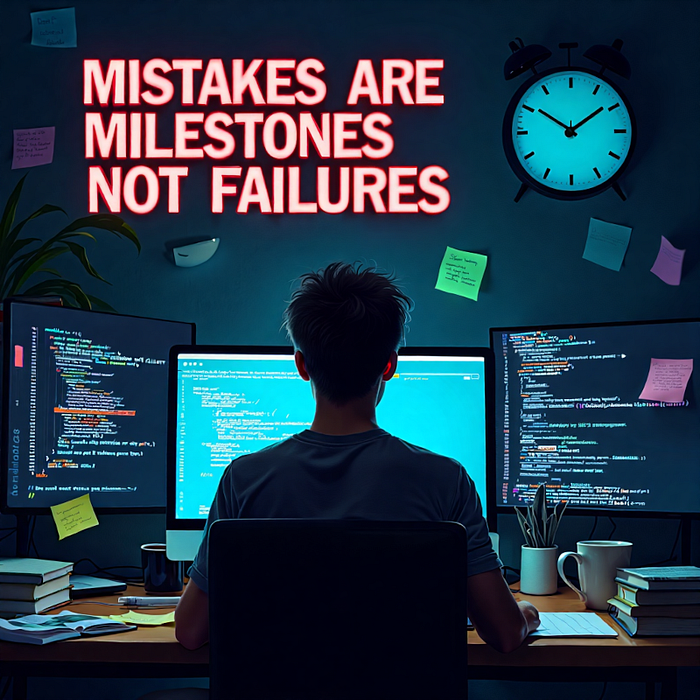Your first code review feels like standing naked in Times Square. The senior dev's cursor hovers over your carefully crafted function, and you realize two things:
- You have no idea why you used a ternary operator here
- The comment "This could be more elegant" is about to haunt your dreams
We've all been there. But after mentoring hundreds of juniors and surviving decades of tech's endless reinvention, I've learned the industry's dirty secret: We're gaslighting new developers into thinking their struggles are failures, not features. Let's unpack the toxic myths before they claim another generation.
Lie #1: "Natural Coders Exist" (And Other Silicon Valley Fantasies)
The myth of the "10x developer" isn't just wrong — it's actively harmful. I've watched brilliant juniors quit after comparing themselves to:
- The conference speaker who "accidentally built Kubernetes over a weekend"
- The LinkedIn influencer claiming "any real engineer" should master Rust in a week
- The senior dev who insists regex is "intuitive"
Here's the truth no one admits: Every "natural" coder you admire has a secret graveyard of abandoned projects and panic-induced Google searches.
I once spent three days debugging an issue where a veteran architect had "simplified" our API. Turns out his "elegant solution" relied on a deprecated npm package that only worked on Tuesdays. Mastery isn't about innate talent — it's about surviving your own mistakes long enough to call them "experience."
Lie #2: "You Should Know This Already"
This phrase has probably killed more coding careers than semicolons in JavaScript. Let's dissect why it's nonsense:
- The tech stack you learned six months ago? It's already legacy.
- That "fundamental concept" they're shaming you over? It was invented in 2015.
- The senior scoffing at your questions? Their first language was COBOL.
Real-world example: A junior I mentored once asked, "How do I choose between MongoDB and PostgreSQL?" Instead of answering, the team mocked him for not knowing. Six months later, we migrated the entire product to a NewSQL database none of us had heard of when he asked.
The fix? Replace "You should know this" with "Let's learn this together."
Lie #3: "Imposter Syndrome Fades With Experience"
They'll tell you feeling like a fraud is a phase. After 25 years, I can confirm: The better you get, the more creative your self-doubt becomes.
- 2003: "I'm not a real developer until I understand pointers"
- 2010: "I'm not a real architect until I scale to 1M users"
- 2023: "I'm not a real engineer until I train my own LLM"
The secret? Use the doubt as a compass. That nagging voice questioning "Should I really deploy this?" once prevented me from rolling out a caching bug that would've corrupted $2M in transactions.
Lie #4: "Mentorship Means Lectures"
Modern mentorship has become a content mill of LinkedIn platitudes and rushed 1:1s. Real guidance looks messier:
- Pair debugging a race condition at 2am
- Walking through your browser history to reconstruct how you almost solved it
- Explaining that yes, the CEO's "simple feature request" would actually require rewriting physics
My career was saved by a mentor who showed me their "hall of shame" — a folder of every production outage they'd caused. It contained 127 post-mortems. "You're not bad at coding," they said. "You're just collecting data points."
Lie #5: "Failure Is a Teacher" (But Only for Other People)
Tech loves failure porn — stories of garage startups that failed gloriously before changing the world. But when you break something? Suddenly it's a moral failing.
Let's reframe reality:
- Your failed deployment? Future you will catch that edge case in code reviews.
- Your "stupid question" about containers? Uncovers the team's outdated Docker setup.
- Your "slow progress"? Reveals the sprint estimates were fiction.
The juniors I've seen thrive aren't those who avoid mistakes — they're the ones who document their WTFs per minute and analyze them over beers.
The Truth We Owe the Next Generation
To juniors: Your confusion isn't weakness — it's the immune system detecting BS. When documentation says "it's simple," translate it to "we didn't prioritize onboarding." When seniors roll their eyes, remember: Expertise that can't explain itself is just memorization.
To seniors: Your value isn't in having answers — it's in how you respond to "I don't know." That junior asking "dumb questions"? They're the canary in your codebase's coal mine.
A Challenge for All of Us
Tomorrow, do one thing that terrifies you:
- Juniors: Ask "Why?" in a meeting when everyone's nodding along
- Seniors: Share your most cringe-worthy failure in a team retro
- Everyone: Bookmark this article and revisit it when the doubt creeps in
The industry won't change until we stop pretending we've always known what we're doing.
Your Move If you've ever whispered "I have no idea what I'm doing" while merging code, this is your permission slip: Keep going. Now pass it on.
🔥 Clap if you've ever Googled "how to exit Vim" during a Zoom call 💬 Comment with the lie that almost broke you 👨💻 25-year confession: I still have nightmares about Perl


